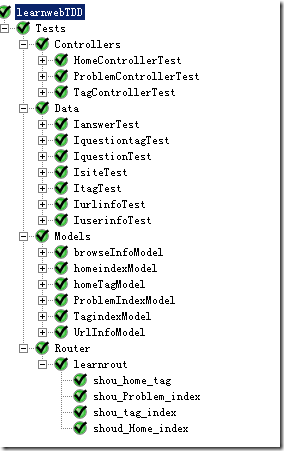我的新博客地址:http://cuipengfei.me/blog/2013/12/23/desugar-scala-4/
Scala中有一个type关键字,用来给类型或者是操作起别名,用起来很是方便。
比如这样:
1
|
type People = List[Person]
|
这样就是给List[Person](方括号是Scala的类型参数的写法)声明了一个别名,叫做People。
接下来就可以这样使用它:
1
2
3
|
def teenagers(people: People): People = {
people.filter(person => person.age < 20)
}
|
这个代码编译之后没有什么神奇的,仅仅是把所有出现People这个字眼的地方都用List of Person替代了。
1
2
3
4
5
6
7
|
public List<Person> teenagers(List<Person> people)
{
return (List)people.filter(new AbstractFunction1() { public static final long serialVersionUID = 0L;
public final boolean apply(Person person) { return person.age() < 20; }
});
}
|
这种给类型一个别名的特性只是一个小糖豆,不太甜,真正有趣的是给一类操作命名(联想C#中定义delegate)。
比如这样:
1
|
type PersonPredicate = Person => Boolean
|
接受一个Person,返回一个Boolean,我们把这一类用来判断一个人是否符合某个条件的操作统称为PersonPredicate。
然后我们可以定义以下predicate:
1
|
val teenagerPred: PersonPredicate = person => person.age < 20
|
然后前面写过的teenagers方法就可以这样重新定义:
1
2
3
|
def teenagers(people: People): People = {
people.filter(teenagerPred)
}
|
按照这个思路下去,我们就可以开始composite functions了。比如说,我们跟人收税,就可以这么做:
1
2
3
4
5
6
7
8
9
10
11
12
13
14
15
|
type Tax = Person => Double
val incomeTax: Tax = person => person.income * 5 / 100
val kejuanzaTax: Tax = person => person.income * 20 / 100
def giveMeYourMoney(p: Person) = {
calculateTax(p, List(incomeTax, kejuanzaTax))
}
def calculateTax(person: Person, taxes: List[Tax]): Double = {
taxes.foldLeft(0d) {
(acc, curTax) => acc + curTax(person)
}
}
|
从一个人那里拿到钱,这种操作,我们称之为Tax。然后定义个税和苛捐杂税,或者也可以有任意多的税种。
然后就可以把任意的几个税种放在一个List里面,和calculateTax去composite了。
当然,没有type这个关键字,我们也可以composite functions。只不过就得写成这样:
1
2
|
val teenagerPred: (Person) => Boolean = person => person.age < 20
def incomeTax: (Person) => Double = person => person.income * 5 / 100
|
看着稍微有点眼花。
这种用type关键字给一种操作命名的代码反编译之后是这样的:
1
2
3
4
5
6
7
8
9
10
11
12
13
14
15
16
17
18
19
20
|
public Function1<Person, Object> teenagerPred()
{
return new AbstractFunction1() { public static final long serialVersionUID = 0L;
public final boolean apply(Person person) { return person.age() < 20; } } ;
}
public Function1<Person, Object> incomeTax()
{
return new AbstractFunction1() { public static final long serialVersionUID = 0L;
public final double apply(Person person) { return person.income() * 5 / 100; } } ;
}
public Function1<Person, Object> kejuanzaTax()
{
return new AbstractFunction1() { public static final long serialVersionUID = 0L;
public final double apply(Person person) { return person.income() * 20 / 100; } } ;
}
|
可以看到所有这种接受一个参数,返回一个值的操作都是Function1<Person, Object>。
推测一下,接受两个参数,返回一个值的是不是该叫做Function2呢?
1
2
3
|
type TwoToOne = (String, Int) => Double
def twoToOneImpl: TwoToOne = (str, i) => 1
|
反编译之后,果不其然:
1
2
3
4
|
public Function2<String, Object, Object> twoToOneImpl()
{
return new Hello..anonfun.twoToOneImpl.1(this);
}
|
那不接收参数,只有返回值的呢?
1
2
3
|
type NoInJustOut = () => String
def noInJustOutImpl: NoInJustOut = () => "hello world"
|
反编译之后,其实是变成了Function0 of String:
1
2
3
4
|
public Function0<String> noInJustOutImpl()
{
return new Hello..anonfun.noInJustOutImpl.1(this);
}
|
到这里,我们可以总结一下type alia这个糖衣:
一个类型的type alias,类似于这样的:type t = x。编译器将在所有使用到t的地方把t替换为x。
对于一种操作的type alias,编译器将会根据参数列表和返回值类型的不同将其替换为对应的Function0,Function1,Function2 …… 一直到Function22。
如果我们真的定义一个超过二十二个参数的操作会如何呢?
1
2
3
4
5
6
7
8
|
type twentyThree = (
String, String, String, String,
String, String, String, String,
String, String, String, String,
String, String, String, String,
String, String, String, String,
String, String, String
) => String
|
Scala编译器会直接告诉我们: type Function23 is not a member of package scala
|
这本很薄的小书,今年读了至少4边,汤姆大叔翻译的js也看了几遍,受益匪浅
现在已经完成了60%的代码重构,因为垃圾站很简单,
虽然现在还没有深入到复杂模块和高难度模块单元测试,但普通的单元测试已经解决了我很多问题了
1 拖沓,以前写一个模块用老长时间,都是周末或平时有空写写,有时候记不起来几个月前定的需求,就一直放着,等想起来在写
现在先写完单元测试代码,明确的具体的规则,和目标,每次写之前先运行一次单元测试看哪里还没写,拖沓的毛病得到治疗。
个人感觉对创业团队更为重要:1防止拖沓 2防止赶工期出垃圾工程
2长函数,以前也不是有意写长函数,只不过写着写着写着就边长了,我也没办法,
现在写的时候先要想,我要怎么测试这个东西,复杂的东西不会测,写简单点,好测试
3成就感,,,,每次看着X号变绿色,心情都好了
|
 |

